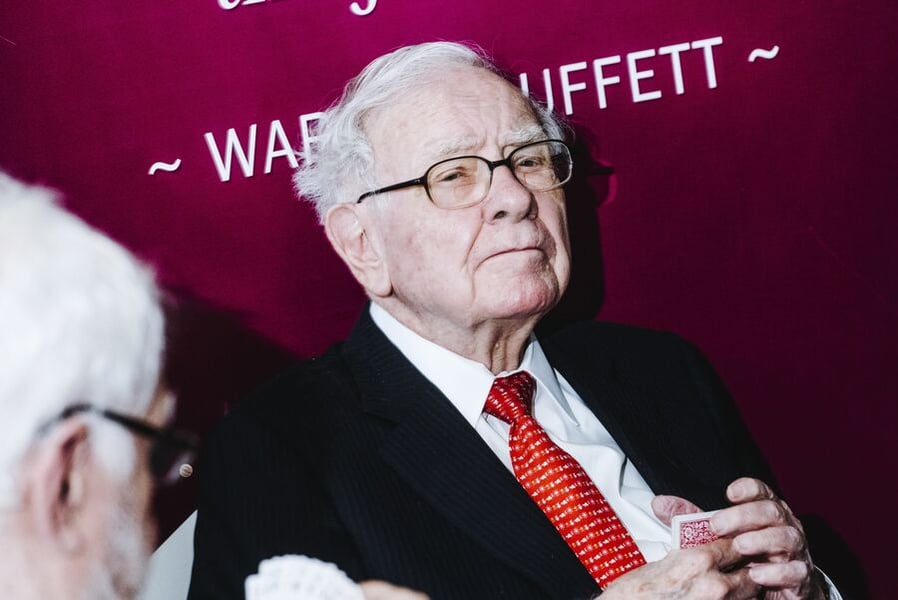

To paraphrase the famous line from "Jaws," "We’re going to need a bigger moat."
Shares of Warren Buffett’s Berkshire Hathaway have returned 14% year-to-date, compared with a 15.5% rise for the S&P 500. Over the past 5 years, however, Buffett’s holding company is up 71% compared with the S&P 500’s 53% return. Go back even further, and Buffett’s baby really blows away the benchmark index.
Much of Buffett’s long-term success derives from his ability to identify companies with what he calls “economic moats” surrounding them. Buffett, who turns 93 at the end of August, explained his moat principal at the 1995 Berkshire Hathaway shareholders meeting: “We're trying to find a business with a wide and long-lasting moat around it, protecting a terrific economic castle with an honest lord in charge of the castle."
As Buffett describes it, the moat can stem from the company being the low-cost producer in a particular area, having a technological advantage, or it could simply be “because of its position in the consumers' mind.”
In its 13F filing last week, Berkshire revealed its stock portfolio — worth about $351 billion — comprises 55 positions, with Apple making up nearly half. Other top holdings include long-time Berkshire favorites Bank of America, Coca-Cola and Chevron.
Brandon Rakszawski, director of product management with VanEck, said the VanEck Morningstar Wide Moat ETF (MOAT) was designed to capture the concept of “wide moat” stocks even though Buffett is not affiliated with the fund, which is up 19.5% year-to-date and 69.5% over the past five years.
“He's served as a bit of an inspiration for Morningstar's embrace of economic moats and trying to assess whether that company has an economic moat," Rakszawski said. "So while he's not behind endorsing or puppeteering this particular strategy, he has certainly been an influence in the market and behind the strategy.”
Do as the Oracle of Omaha says, not as he does. At least that’s what financial advisors tend to believe when it comes to Warren Buffett.
Nicholas Bunio, a certified financial planner at Retirement Wealth Advisors, is an unabashed fan of Buffett, having listened to his market wisdom for years. That said, Bunio advises wealth managers not to try to copycat Buffett’s market moves.
“Buffett is investing for Berkshire Hathaway, a company that could, theoretically, last forever. You and I won't live that long. We have finite resources with finite ends,” he said.
Similarly, Mark McEvily, CIO and managing partner at Jessup Wealth Management, said the risk tolerance, investment objectives and time horizon of Buffett and Berkshire Hathaway are very different than the average advisory client.
“Buffett has endured massive drawdowns throughout his career because of the risk he has taken. Our average client, on the other hand, could not endure that type of volatility in their accounts,” McEvily said.
Jon Swanburg, president of TSA Wealth Management, said that while Buffett’s market moves and stock picking aren’t specifically relevant to his business, he certainly shares his general investing philosophy. In Swanburg's view, no investor has been more quotable in his consistent advocacy for holding stocks for the long-run and tuning out the noise.
“When the rest of the investment world is trying to convince retirees they need to be worried about everything, we can always cite something Warren Buffett has written or said during his career that is calming and accurate in the moment,” Swanburg said.
Buffett’s pearls of wisdom, as opposed to his stock picks, are also the attraction for Steve Oniya, financial advisor with OM Investments.
“I don't personally make decisions based on his daily moves. Everyone's situation, including risk tolerance or time horizon, and perspectives can be different,” said Oniya. “But I do keep in mind many of his long-term perspectives and life lessons when circumstances are a fit.”
Rory O’Hara, founder and senior managing partner of Ausperity Private Wealth, also said he doesn't tail Buffett's individual stock picks, but agrees with his investing principles, especially his famous quote, “Be fearful when others are greedy and greedy when others are fearful.”
“That’s the basis for our rebalancing strategies,” O’Hara said.
For David Demming, founder of Demming Financial, Buffett’s appeal is more about his value philosophy than his cult of personality.
“We have been strong proponents of value investing for more than forty years. Benjamin Graham was the professor who mentored Warren Buffett and wrote 'The Intelligent Investor.' Many of our managers have been disciples,” Demming said.
Finally, Greg Halter, director of research at Carnegie Investment Counsel, said that even though he is not a “die-hard proponent” of everything that Warren Buffet does, he does seek companies that share many of the attributes Buffett has espoused for decades, most notably those that have a durable competitive advantage, or DCA.
Or in Buffett’s vernacular, an “economic moat.”

The RIA's addition in Dallas, previously with Raymond James, comes just as the take-private deal between Corient's parent firm in Canada and Mubadala Capital comes to completion.

LPL's head of HNW planning says too many advisors are making a common mistake.

Market risk index shows hidden perils in seeking safety, and potential benefits from non-traditional investment vehicles.

Friends and family members are "the easiest type of victim to profile and steal from," said one attorney.

The commissioner also known as "Crypto Mom" says the agency is willing to work on different models with stakeholders, though disclosures will remain key.
Stan Gregor, Chairman & CEO of Summit Financial Holdings, explores how RIAs can meet growing demand for family office-style services among mass affluent clients through tax-first planning, technology, and collaboration—positioning firms for long-term success
Chris Vizzi, Co-Founder & Partner of South Coast Investment Advisors, LLC, shares how 2025 estate tax changes—$13.99M per person—offer more than tax savings. Learn how to pass on purpose, values, and vision to unite generations and give wealth lasting meaning
